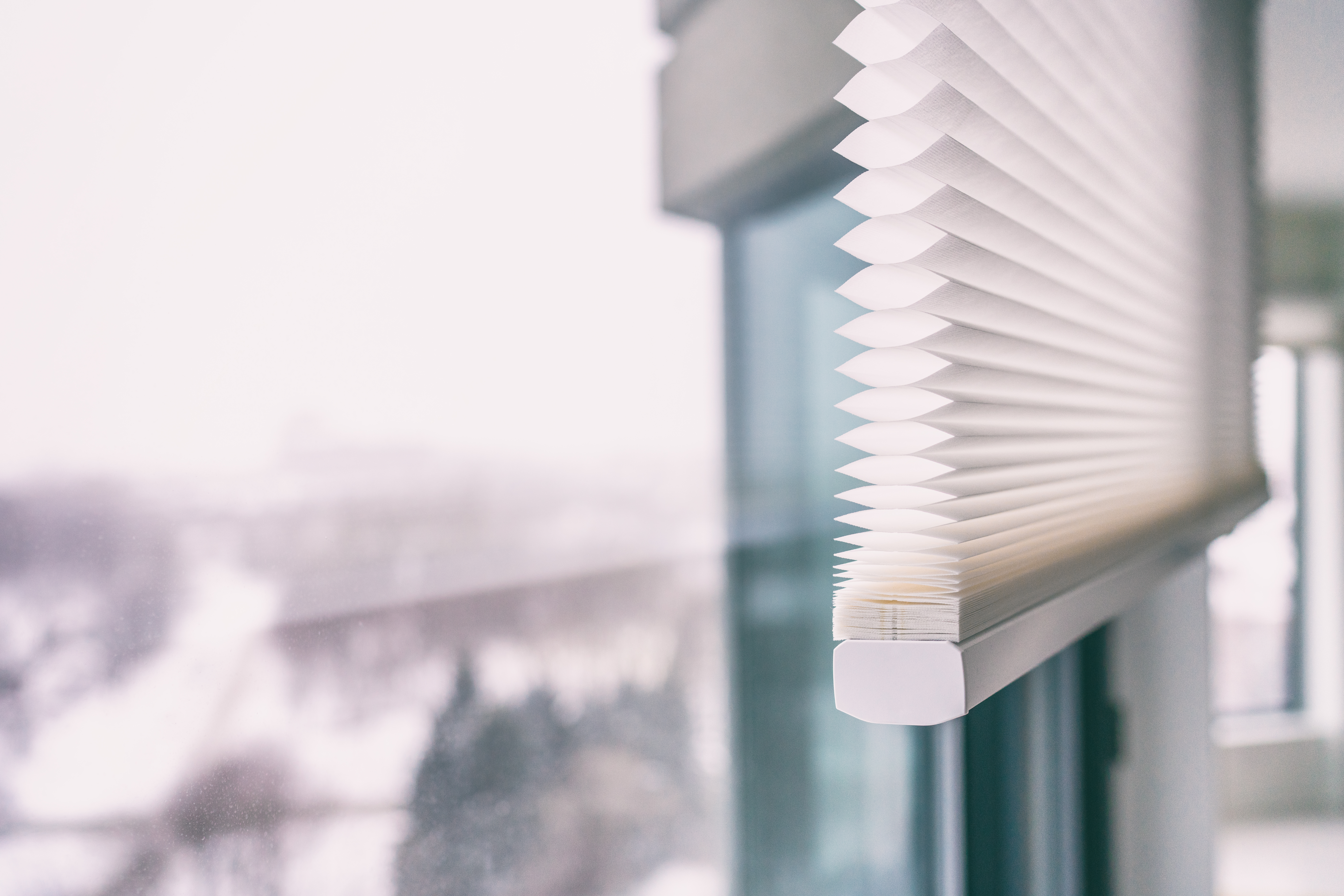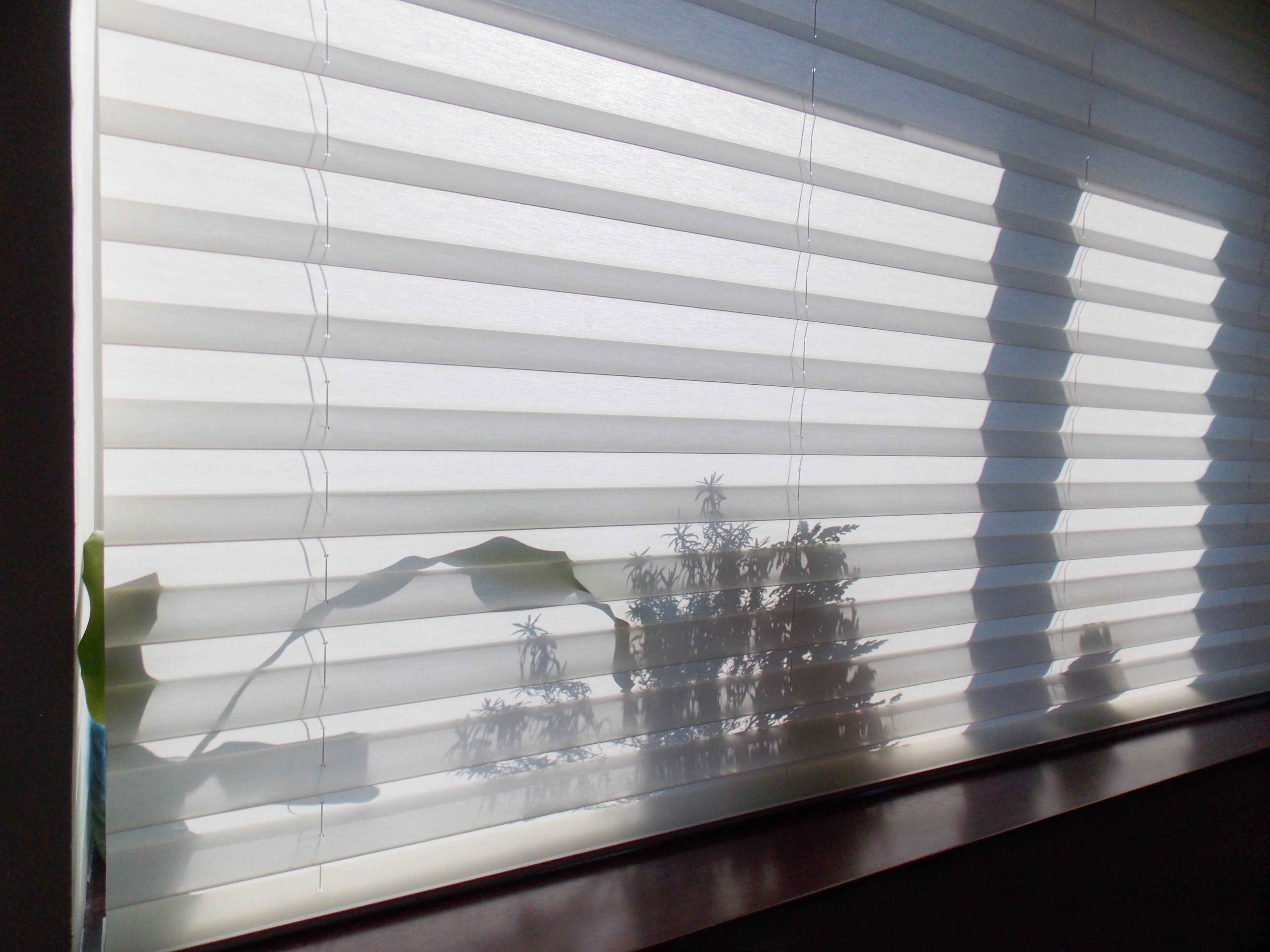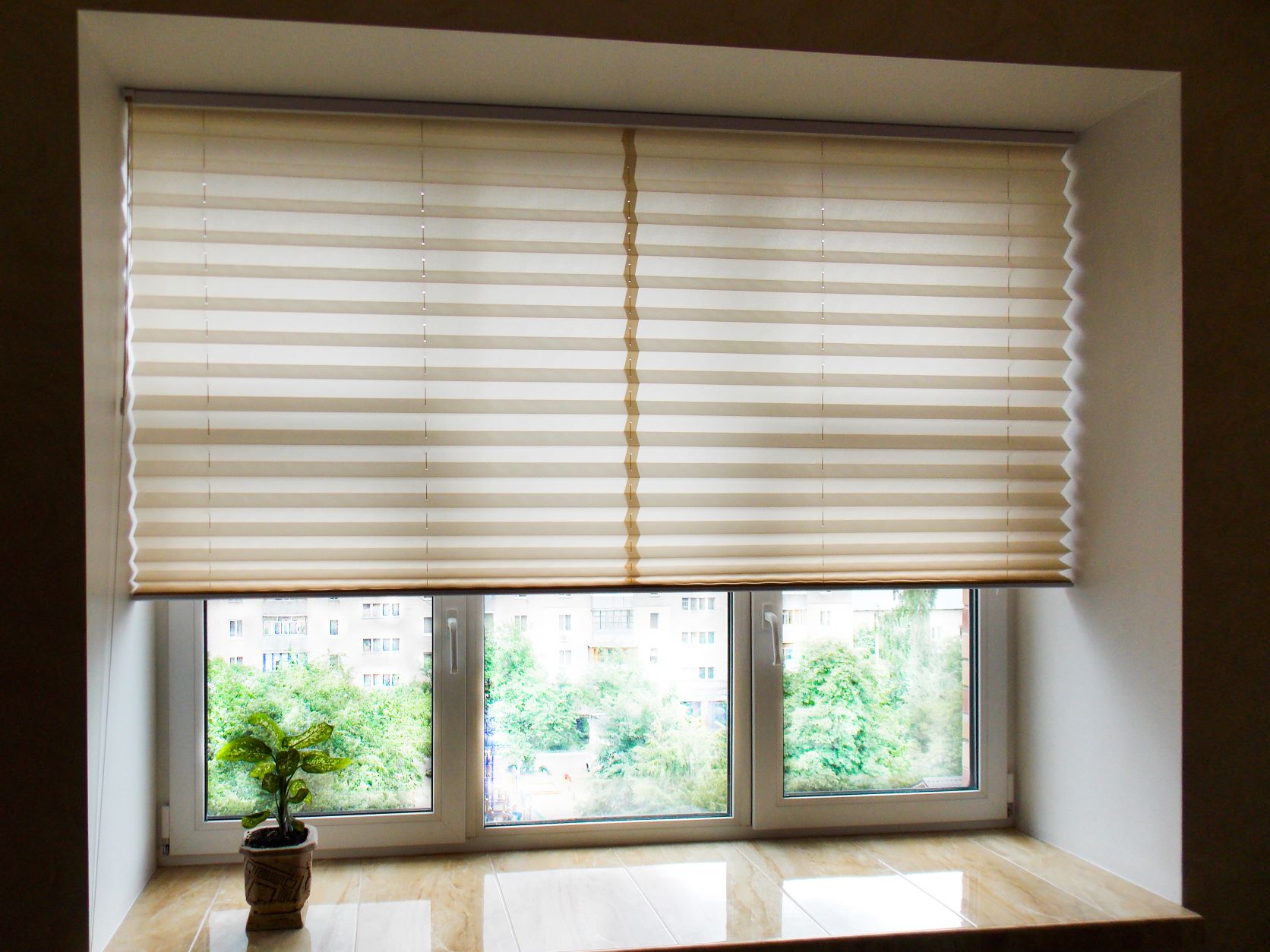
Single cell shades feature a single layer of cells, while double cell shades comprise two rows of cells, with one row closer to the window and the other closer to the room. Due to this dual-layer structure, double cell shades offer superior insulation against external noise. Single cell shades come in wider widths. (3/8 inch to 2 inches). Double cell shades are often narrower in width. (½ inch or less).
Choosing between single and double cell shades often depends on your specific needs and preferences. If energy efficiency and maximum insulation are top priorities, double cell shades may be the better option. However, if you're looking for a more budget-friendly choice that still offers good insulation and light control, single cell shades could be a suitable choice.
Let Bloomin' Blinds be your guide to more information. Click here to find a location near you!


Single cell and double cell shades are both popular options for window treatments, especially when it comes to energy efficiency and light control. Here's a breakdown of their differences:
Honeycomb shades and cellular shades two names for the same thing. This sometimes confuses homeowners shopping for window treatments, who wonder if they are different in some way. Some manufacturers label their shades as cellular, while others use the term honeycomb based on the shape created by the tubular cells when looking at the side of the shades. No matter which name you use, you can rest assured you're talking about the same type of window treatment.
Generally speaking, the material you choose for your cellular shades will have more effect on how much light comes through than whether you opt for single cell or double cell construction. The extra layer of pockets on a double cell shade offers extra insulation and additional noise reduction, but single and double cell shades are similarly effective at blocking light.
Whether single cell or double cell, cellular shades are among the most insulating window treatments available. The pockets of air created by the cells add a barrier for hot or cold air trying to pass through, which helps keep your home at the temperature you want. Thanks to twice the insulating air pockets, double cell shades offer exceptional energy efficiency and can make a significant impact on your heating or cooling bills.
Ready to find the perfect cellular shades for your windows in single cell or double cell construction? Request a free consultation with Bloomin' Blinds today!

About the Author: Kris Stuart, Bloomin' Blinds
Kris has been a window covering expert in the industry since 2001. He has expertise in a wide range of window covering matters, including repairs, installations, sales, and administration. In his free time, Kris loves to spend time with his wife and kids, making them laugh, travel together, and trying new hobbies.
Warranty Info: All products offered by Bloomin’ Blinds are covered by a limited lifetime warranty for the original purchaser. The warranty protects against the following items: Warping, discoloration, manufacturer material defects and install issues. In the event of a warranty need, there will be no cost to the homeowner and Bloomin’ Blinds will service the repair at your home/office whenever possible. *** Warranty specifics varies by location, please contact for more information.
We are currently looking to expand our business in the territories listed below.
We are always looking to grow! If your preferred location is not listed, feel free to leave a note upon filling out the contact form!
Contact UsWe are currently looking to expand our business in the territories listed below.
We are always looking to grow! If your preferred location is not listed, feel free to leave a note upon filling out the contact form!
Contact UsWe currently have no opportunities available in the entire state of West Virginia.
We are always looking to grow! If your preferred location is not listed, feel free to leave a note upon filling out the contact form!
Contact UsWe are currently looking to expand our business in the territories listed below.
We are always looking to grow! If your preferred location is not listed, feel free to leave a note upon filling out the contact form!
Contact UsWe are currently looking to expand our business in the territories listed below.
We are always looking to grow! If your preferred location is not listed, feel free to leave a note upon filling out the contact form!
Contact UsWe are currently looking to expand our business in the territories listed below.
We are always looking to grow! If your preferred location is not listed, feel free to leave a note upon filling out the contact form!
Contact UsWe are currently looking to expand our business in the territories listed below.
We are always looking to grow! If your preferred location is not listed, feel free to leave a note upon filling out the contact form!
Contact UsWe are currently looking to expand our business in the territories listed below.
We are always looking to grow! If your preferred location is not listed, feel free to leave a note upon filling out the contact form!
Contact UsWe are currently looking to expand our business in the territories listed below.
We are always looking to grow! If your preferred location is not listed, feel free to leave a note upon filling out the contact form!
Contact UsWe currently have no opportunities available in the entire state of South Dakota.
We are always looking to grow! If your preferred location is not listed, feel free to leave a note upon filling out the contact form!
Contact UsWe are currently looking to expand our business in the territories listed below.
We are always looking to grow! If your preferred location is not listed, feel free to leave a note upon filling out the contact form!
Contact UsWe are currently looking to expand our business in the territories listed below.
We are always looking to grow! If your preferred location is not listed, feel free to leave a note upon filling out the contact form!
Contact UsWe are currently looking to expand our business in the territories listed below.
We are always looking to grow! If your preferred location is not listed, feel free to leave a note upon filling out the contact form!
Contact UsWe are currently looking to expand our business in the territories listed below.
We are always looking to grow! If your preferred location is not listed, feel free to leave a note upon filling out the contact form!
Contact UsWe are currently looking to expand our business in the territories listed below.
We are always looking to grow! If your preferred location is not listed, feel free to leave a note upon filling out the contact form!
Contact UsWe are currently looking to expand our business in the territories listed below.
We are always looking to grow! If your preferred location is not listed, feel free to leave a note upon filling out the contact form!
Contact UsWe currently have no opportunities available in the entire state of North Dakota.
We are always looking to grow! If your preferred location is not listed, feel free to leave a note upon filling out the contact form!
Contact UsWe are currently looking to expand our business in the territories listed below.
We are always looking to grow! If your preferred location is not listed, feel free to leave a note upon filling out the contact form!
Contact UsWe are currently looking to expand our business in the territories listed below.
We are always looking to grow! If your preferred location is not listed, feel free to leave a note upon filling out the contact form!
Contact UsWe are currently looking to expand our business in the territories listed below.
We are always looking to grow! If your preferred location is not listed, feel free to leave a note upon filling out the contact form!
Contact UsWe are currently looking to expand our business in the territories listed below.
We are always looking to grow! If your preferred location is not listed, feel free to leave a note upon filling out the contact form!
Contact UsWe currently have no opportunities available in the entire state of New Hampshire.
We are always looking to grow! If your preferred location is not listed, feel free to leave a note upon filling out the contact form!
Contact UsWe are currently looking to expand our business in the territories listed below.
We are always looking to grow! If your preferred location is not listed, feel free to leave a note upon filling out the contact form!
Contact UsWe currently have no opportunities available in the entire state of Nebraska.
We are always looking to grow! If your preferred location is not listed, feel free to leave a note upon filling out the contact form!
Contact UsWe are currently looking to expand our business in the territories listed below.
We are always looking to grow! If your preferred location is not listed, feel free to leave a note upon filling out the contact form!
Contact UsWe are currently looking to expand our business in the territories listed below.
We are always looking to grow! If your preferred location is not listed, feel free to leave a note upon filling out the contact form!
Contact UsWe are currently looking to expand our business in the territories listed below.
We are always looking to grow! If your preferred location is not listed, feel free to leave a note upon filling out the contact form!
Contact UsWe are currently looking to expand our business in the territories listed below.
We are always looking to grow! If your preferred location is not listed, feel free to leave a note upon filling out the contact form!
Contact UsWe are currently looking to expand our business in the territories listed below.
We are always looking to grow! If your preferred location is not listed, feel free to leave a note upon filling out the contact form!
Contact UsWe are currently looking to expand our business in the territories listed below.
We are always looking to grow! If your preferred location is not listed, feel free to leave a note upon filling out the contact form!
Contact UsWe are currently looking to expand our business in the territories listed below.
We are always looking to grow! If your preferred location is not listed, feel free to leave a note upon filling out the contact form!
Contact UsWe are currently looking to expand our business in the territories listed below.
We are always looking to grow! If your preferred location is not listed, feel free to leave a note upon filling out the contact form!
Contact UsWe are currently looking to expand our business in the territories listed below.
We are always looking to grow! If your preferred location is not listed, feel free to leave a note upon filling out the contact form!
Contact UsWe are currently looking to expand our business in the territories listed below.
We are always looking to grow! If your preferred location is not listed, feel free to leave a note upon filling out the contact form!
Contact UsWe are currently looking to expand our business in the territories listed below.
We are always looking to grow! If your preferred location is not listed, feel free to leave a note upon filling out the contact form!
Contact UsWe are currently looking to expand our business in the territories listed below.
We are always looking to grow! If your preferred location is not listed, feel free to leave a note upon filling out the contact form!
Contact UsWe are currently looking to expand our business in the territories listed below.
We are always looking to grow! If your preferred location is not listed, feel free to leave a note upon filling out the contact form!
Contact UsWe are currently looking to expand our business in the territories listed below.
We are always looking to grow! If your preferred location is not listed, feel free to leave a note upon filling out the contact form!
Contact UsWe are currently looking to expand our business in the territories listed below.
We are always looking to grow! If your preferred location is not listed, feel free to leave a note upon filling out the contact form!
Contact UsWe currently have no opportunities available in the entire state of Hawaii.
We are always looking to grow! If your preferred location is not listed, feel free to leave a note upon filling out the contact form!
Contact UsWe are currently looking to expand our business in the territories listed below.
We are always looking to grow! If your preferred location is not listed, feel free to leave a note upon filling out the contact form!
Contact UsWe are currently looking to expand our business in the territories listed below.
We are always looking to grow! If your preferred location is not listed, feel free to leave a note upon filling out the contact form!
Contact UsWe currently have no opportunities available in the entire state of Delaware.
We are always looking to grow! If your preferred location is not listed, feel free to leave a note upon filling out the contact form!
Contact UsWe are currently looking to expand our business in the territories listed below.
We are always looking to grow! If your preferred location is not listed, feel free to leave a note upon filling out the contact form!
Contact UsWe currently have no opportunities available in the entire state of Colorado.
We are always looking to grow! If your preferred location is not listed, feel free to leave a note upon filling out the contact form!
Contact UsWe are currently looking to expand our business in the territories listed below.
We are always looking to grow! If your preferred location is not listed, feel free to leave a note upon filling out the contact form!
Contact UsWe are currently looking to expand our business in the territories listed below.
We are always looking to grow! If your preferred location is not listed, feel free to leave a note upon filling out the contact form!
Contact UsWe are currently looking to expand our business in the territories listed below.
We are always looking to grow! If your preferred location is not listed, feel free to leave a note upon filling out the contact form!
Contact UsWe currently have no opportunities available in the entire state of Alaska.
We are always looking to grow! If your preferred location is not listed, feel free to leave a note upon filling out the contact form!
Contact UsWe are currently looking to expand our business in the territories listed below.
We are always looking to grow! If your preferred location is not listed, feel free to leave a note upon filling out the contact form!
Contact Us